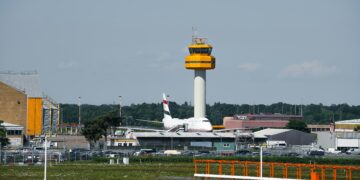While Australia and the UK stated that there were no new regulations for travelers from China, Italy, Japan, Taiwan, and India announced the requirement for testing.
China will begin allowing more citizens to travel freely on January 8 after being closed to the outside world for three years.
However, the nation’s continued Covid increase has raised suspicion.
Analysts believe that China’s reported daily caseload of 5,000 cases is significantly understated and may perhaps be closer to a million. According to reports, hospitals are overburdened and residents are having trouble getting access to basic medications.
The US announced on Wednesday that it would start requiring Covid tests for visitors entering the country from China, Hong Kong, and Macau as of 5 January due to a lack of “sufficient and transparent” Covid data in China.
How many cases of Covid exist in China?
Covid strikes China: “Everyone I know is developing a fever”
In order to “help restrict the spread of the virus as we try to identify any potential new variants that may develop,” according to the US Centers for Disease Control and Prevention.
Coronavirus regulations should only be implemented on a “scientific” basis, according to Beijing’s foreign ministry, which also charged that Western nations and the media were “hyping up” the issue.
On the blocked social media sites in China, several users expressed anger.
“I believed that all of the foreign nations had become more open. Is this not racist?” read a Weibo comment that received 3,000 likes. Regardless of nationality, the US has stated that testing is necessary for everyone arriving from China or via a third country.
Others, though, indicated they were aware of the rationale behind the limits: “This is nothing compared to all the restrictions we had for individuals entering into China,” one person commented.
Beijing only made the decision to lift the arrivals quarantine announcement on Monday, essentially enabling domestic and international travel for the first time since March 2020. Anyone entering China had to undergo quarantine at state facilities until this week.
China has previously been the top market for international travel. But given that there are few planes available and many individuals need to renew their passports, it’s uncertain how many Chinese would travel abroad after January 8.
The response of the international community has varied, with the UK and Australia stating that they were keeping an eye on the Covid issue in China but had no plans to announce new testing criteria.
Others have announced limits quickly:
Beginning on Friday, visitors from China will have their Covid checked at the airport in Japan. The quarantine period may last up to seven days for those who test positive. There will also be fewer flights to and from China.
Travelers to India from China and four other Asian nations are required to present a negative Covid test before arrival. Additionally, positive travellers will be quarantined.
According to Taiwan, from January 1 to January 31, passengers arriving on aircraft from China as well as by boat at two islands would be required to take Covid tests. Those who test positive can stay home and isolate themselves.
Malaysia, meanwhile, has implemented new tracking and surveillance procedures.
Additionally, Italy has made Covid testing for travelers from China mandatory.
In response to China’s Covid rise, the European Commission announced that its health security committee would meet on Thursday to explore “potential steps for a coordinated EU approach.”
However, Italy, an EU member and the virus’ epicenter in late 2019 and early 2020, declared that it was taking the initiative to “guarantee the surveillance and identification” of any new virus variations.
This week’s flights landing in Milan were already screening Chinese passengers. Authorities discovered 52% of passengers on one flight that landed on December 26 had the Covid virus.
According to preliminary examinations of travelers arriving from China who tested positive for Covid, 15 of them had Omicron versions that were already present in Italy, according to Prime Minister Giorgia Meloni. She said the news was really comforting.
Ms. Meloni is advocating for testing Chinese travelers across the entire EU, claiming that Italy’s own procedures could otherwise be useless. Italy is one of the 26 European nations that make up the borderless Schengen zone.
The growth of China’s pandemic situation is currently generally foreseeable and under control, according to China’s foreign ministry, which made this statement on Wednesday.
However, since officials no longer require instances to be recorded and have changed classifications for Covid deaths, it is unknown how many cases and deaths there are on a daily basis in China. Authorities announced on Sunday that they would likewise stop publishing daily case counts.
According to Dr. Chandrakant Lahariya, an Indian epidemiologist and expert in health systems, “the infection rise in China is on expected lines.”
“Cases will increase if you have a susceptible population that hasn’t been exposed to the virus. The rest of the world has not altered at all.”
China’s contentious zero-Covid policy, which President Xi Jinping had personally backed, has come to an end with the country’s decision to reopen its borders.
Beijing persisted on an anti-virus eradication strategy that included widespread testing and strict lockdowns even as the rest of the globe adjusted to living with the illness.
Due to the deteriorating economy and growing anger among the populace, there were sporadic demonstrations against Mr. Xi and his administration in November. Beijing started to relax the restrictions a week later.
Details about this story





















